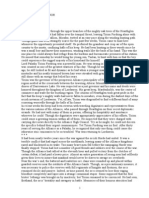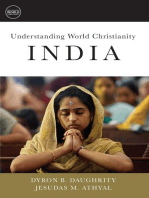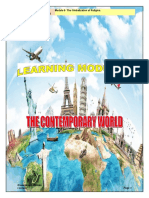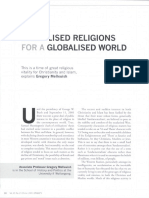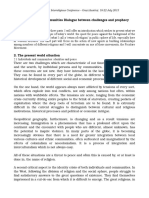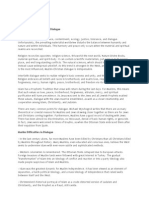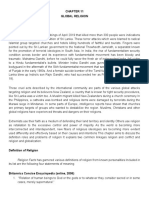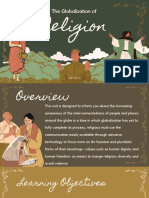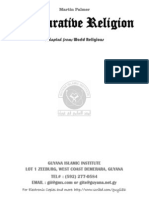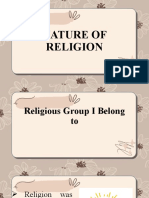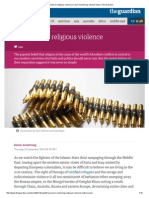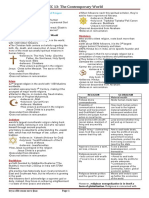Religion, Born Again
Uploaded by
Cătălina VulpițaReligion, Born Again
Uploaded by
Cătălina VulpițaReligion, Born Again
By Rainer Traub Rome, April 2005. People stand shoulder to shoulder on St. Peter's Square. Pope John Paul II has passed away and the colorful crowds, including truant schoolgirls and dudes with dreadlocks - more like fans at a rock concert than churchgoers - have converged on the Vatican to pay their last respects.
The flood of visitors has hardly slowed in the year since, but the attraction now is the new Holy Father. Germans in particular are flocking to see "their" Pope, Benedict XVI, with some 50,000 seeking an audience during his first six months as the leader of the Roman Catholic Church. Are these signs of a religious renaissance in notoriously secular Europe - especially among the young? Or are the multitudes at the Holy See more groupies than true believers - a product of the same media hype that feeds our fixation with soccer icons, pop divas and Hollywood stars? Nobody knows for sure, but one thing is clear. Churches might be emptier than ever, but on a planet that seems to be spinning madly out of control, more and more people are reflecting on the meaning of life - even in the Old World. In the wake of this reawakening, crude Danish caricatures of Mohammed, comments by the Pope in Germany, and an equally controversial production of Mozart's Idomeneo in Berlin in recent months have raised questions about how much religion we need and the values it reflects. The triumph of modernity? The resurgence of religion has been one of the most striking and dramatic phenomena of our time, and has taken some disturbing turns. Terrorists ignite bombs in the name of Allah. The White House is occupied by a U.S. president who calls himself a born-again Christian, prays in public, seeks divine guidance on policy matters, and wraps his policies up in religious garb. At the dawn of the 21st century, religion is strutting onto the world stage as a powerful though volatile actor, playing in an ever-changing range of roles - a development that was inconceivable to most Westerners a generation ago. Then, the triumph of modernity was supposed to be accompanied by the inexorable demise of religion around the world.
That was flat wrong. Indeed, on the continents of Africa and Asia, where religion is gaining in influence, it was never the case.
Yet beyond a few big media events, the balance in Germany has tilted so far toward modernity that religion seems to have lost its moorings. "The day is no longer far off," prophesied Klaus Harpprecht in Germany's Die Zeit newspaper, "when the religious foundations of our civilizations will be as alien to most Germans as those of ancient Egypt and the Aztecs." And there's no disputing it: Barring in Catholic Poland, membership in traditional Christian churches has declined dramatically in Europe, along with the awareness of the Continent's Christian heritage. Claims that religion is eroding are only partly true. The argument doesn't hold for most of the 15 million Muslims in Europe. If anything, Islam has surged in recent years. "Religious observance has increased among Muslims since September 11," says Ali Kizilkaya, chairman of the German Islamic Council. Attendance at Friday prayers in the country was up by almost 50 percent in the millennium's first five years, according to the Islamic Archives in Germany. Stoking the conflict But the rebirth of religion in Europe has also ignited hostilities between faiths. For many secular Westerners, the headscarves of devout Muslim women have come to symbolize the spread of religious fundamentalism. Muslim organizations complain about constant insinuations that they have links with terrorism. Meanwhile, fundamentalist ideologues and Islamic preachers here and abroad are stoking the conflict between Western Europe's nonMuslim majorities and its Islamic communities. Caricatures of the prophet Mohammed published in a Danish newspaper sparked violent protests worldwide at the start of the year. The Danish consulates in Beirut and Damascus went up in flames, and several people died in riots in Afghanistan, Pakistan and Nigeria. Yet what may have looked like spontaneous outbursts of fury were in fact carefully orchestrated attacks. After Pope Benedict XVI made reference to a centuries-old quotation critical of the teachings of Mohammed in a speech in September, further storms of protest erupted in many Muslim countries. The Pope swiftly expressed his respect for Islam, arguing that his words had been misunderstood. In Somalia, Islamic radicals responded to his speech by murdering a Catholic nun.
That same month, the unease unleashed by these developments in Germany resounded at the Deutsche Oper in Berlin, one of the country's leading opera houses. City officials warned that its production of Idomeneo - which included beheadings of Mohammed, Jesus and Buddha - might incense Muslims. The opera was canceled at first, and only rescheduled for the end of 2006 after a heated public debate. The consequences of the mounting mutual mistrust are becoming increasingly difficult to ignore. A vicar in the eastern German city of Erfurt became so worried about the Islamization of Europe that he set himself ablaze, hoping that his death would alert Christians to the perceived threat. Meanwhile, people's ability to distinguish between the vast majority of Muslims, who aspire to peaceful lives within European societies, and a violent, fanatical fringe is fading fast. According to a report in the International Herald Tribune on the mood in six major European cities, a general wariness toward Islam, only found in extreme right-wing circles a few years back, is now gaining ground in the political center and even on the liberal left. "It has become politically correct," the paper quoted the Danish Muslim Wahid Pedersen, "to attack Islam, ... making it hard for moderates on both sides to remain reasonable." Around the world, Islam is attracting more converts than any other religion, despite its own internal divisions. The majority of Muslim societies are located in less developed regions, where large families remain the rule. Islam is nevertheless unlikely to become the globe's biggest religion in the foreseeable future. In 1970, a seventh of the Earth's population was Muslim; today Muslims make up one-fifth. Influx of new adherents For similar demographic and cultural reasons, the global proportion of Hindus has also grown, but more slowly - from 12.5 percent in 1970 to 13.3 percent in 2002. Since the 1960s, increasingly aggressive fundamentalist currents have emerged in Hinduism, directing their venom above all against the Muslim minority in India. Despite the expansion of these other world religions, Christianity still counts the largest number of followers worldwide. Just under one-third of the world's population belongs to the Catholic Church or another Christian denomination. But Christianity's people power varies from continent to continent. While the number of self-declared Christians in Europe is steadily shrinking, the ranks of new converts in Africa are all but exploding. In 1900, there were some 10 million Christians in Africa; today the figure is estimated at 390 million, almost half of the continent's entire population.
This ascent of Africa is due primarily to Christian missionaries. Pentecostal Protestants, who place greater emphasis on revivalism and ecstatic religious experience - like speaking in tongues - than on theology, have proved particularly successful. In South Korea and Latin America, Pentecostal Protestants have lured many millions of worshippers away from the Catholic Church, especially in Brazil. In Russia and other parts of the former Soviet Union, the religious revival has spawned an enormous influx of new adherents to the Orthodox faith. After the collapse of communism - which had promised a "paradise on earth" - more traditional religions regained their appeal, in line with the global trend. "Experts agree that the huge rise in Islamic fundamentalist movements in recent decades is largely fueled by people who had expected communism to bring about justice and equality," according to German religious scholar Peter Antes (64).
But some other scholars would in fact disagree. Faith's comeback has less to do with disappointed hopes for a better society than with unanswered questions about the meaning of human existence: "The notion that religion would die out has proved an illusion. Religion, as a response to the transcendental origins of human existence, is a core feature of every culture," wrote academics in the German Lutheran Church in a recent white paper. Even in Western civilization with its focus on reason and enlightenment, there are signs that faith in God and earthly knowledge are eminently compatible:
Many scientists, including leading international physicists like Hanspeter Drr and Wolfgang Weidlich, have come out as believers.
In his recent book, The Language of God, U.S. geneticist Francis Collins cites surveys showing that 40 percent of American scientists believe in God. Collins forcefully dismisses the pseudoscientific teachings of Christian zealots such as "intelligent design" or "creationism." Like Pope Benedict XVI, he insists that Darwin's theory of evolution is not at odds with the Christian faith.
From the very outset in the United States, religion has wielded a powerful formative influence on the world's most scientifically and technologically advanced nation.
You might also like
- WarCraft - of Blood and Honor by Chris Metzen (Bonus)100% (8)WarCraft - of Blood and Honor by Chris Metzen (Bonus)41 pages
- World of Warcraft - (2007) Tides of Darkness - Aaron Rosenberg100% (5)World of Warcraft - (2007) Tides of Darkness - Aaron Rosenberg125 pages
- 2013 Individual and Communities Dialogue Between Challenges and ProphecyNo ratings yet2013 Individual and Communities Dialogue Between Challenges and Prophecy13 pages
- Module 4 Globalization of Religion and Mass Media(1)No ratings yetModule 4 Globalization of Religion and Mass Media(1)13 pages
- Presentation Rafael Palomino (Sin Vínculos Notas)No ratings yetPresentation Rafael Palomino (Sin Vínculos Notas)6 pages
- Articles: The Necessity of Interfaith DialogueNo ratings yetArticles: The Necessity of Interfaith Dialogue6 pages
- GLOBALIZATION OF RELIGION (Written Report)No ratings yetGLOBALIZATION OF RELIGION (Written Report)20 pages
- Spirituality - The New Religion For The New AgeNo ratings yetSpirituality - The New Religion For The New Age23 pages
- The Globalization of Religion - GROUP 1No ratings yetThe Globalization of Religion - GROUP 130 pages
- The Contemporary World Module 2 Lesson 2No ratings yetThe Contemporary World Module 2 Lesson 28 pages
- Thomas, Scott Religious and Global SecurityNo ratings yetThomas, Scott Religious and Global Security18 pages
- The Globalization of Religon (GROUP 3 CLASS OF SSP 113 AB2E)50% (2)The Globalization of Religon (GROUP 3 CLASS OF SSP 113 AB2E)39 pages
- W7 The Globalization of Religion - ModuleNo ratings yetW7 The Globalization of Religion - Module11 pages
- Module 8.2 - Religion and Belief SystemsNo ratings yetModule 8.2 - Religion and Belief Systems7 pages
- The Major Kinds of Religions in The WorldNo ratings yetThe Major Kinds of Religions in The World10 pages
- Eligion: After Reading This Chapter, You Should Be Able ToNo ratings yetEligion: After Reading This Chapter, You Should Be Able To18 pages
- Giving Up On God: The Global Decline of ReligionNo ratings yetGiving Up On God: The Global Decline of Religion16 pages
- Department of Social Sciences: Central Mindanao UniversityNo ratings yetDepartment of Social Sciences: Central Mindanao University6 pages
- The Myth of Religious Violence - Karen Armstrong - World News - The GuardianNo ratings yetThe Myth of Religious Violence - Karen Armstrong - World News - The Guardian19 pages
- (S) Warcraft - Road To Damnation by Evelyn FredericksenNo ratings yet(S) Warcraft - Road To Damnation by Evelyn Fredericksen10 pages
- (S) Warcraft - War of The Shifting Sands - Micky NeilsonNo ratings yet(S) Warcraft - War of The Shifting Sands - Micky Neilson6 pages
